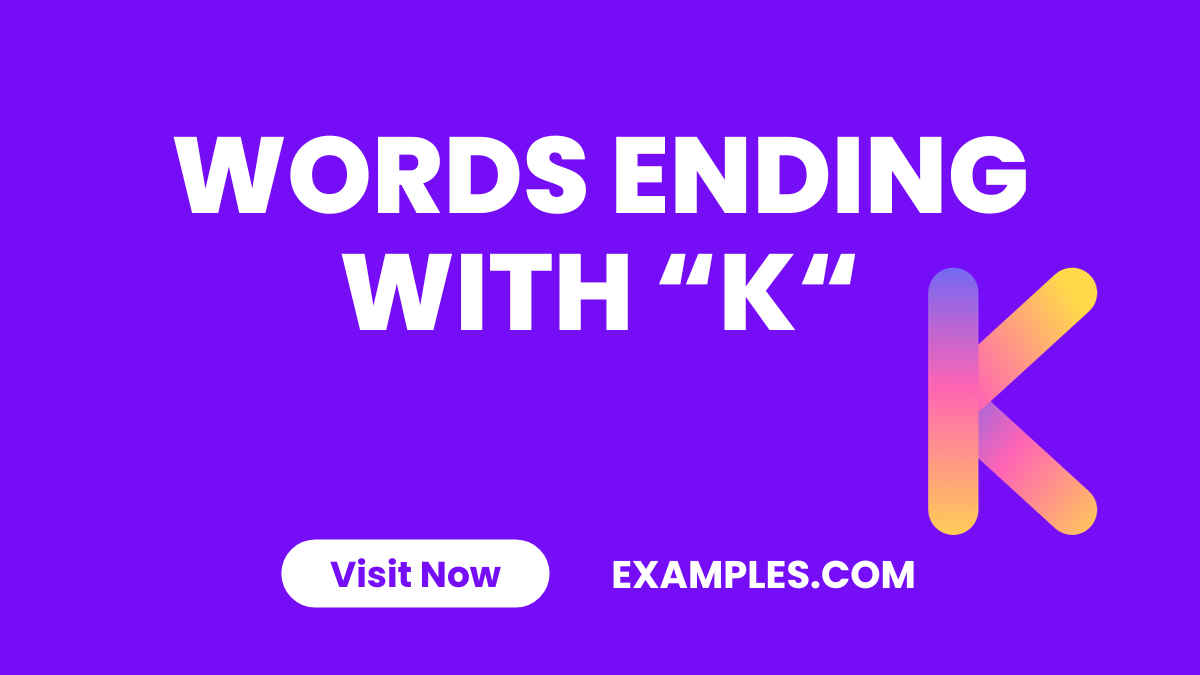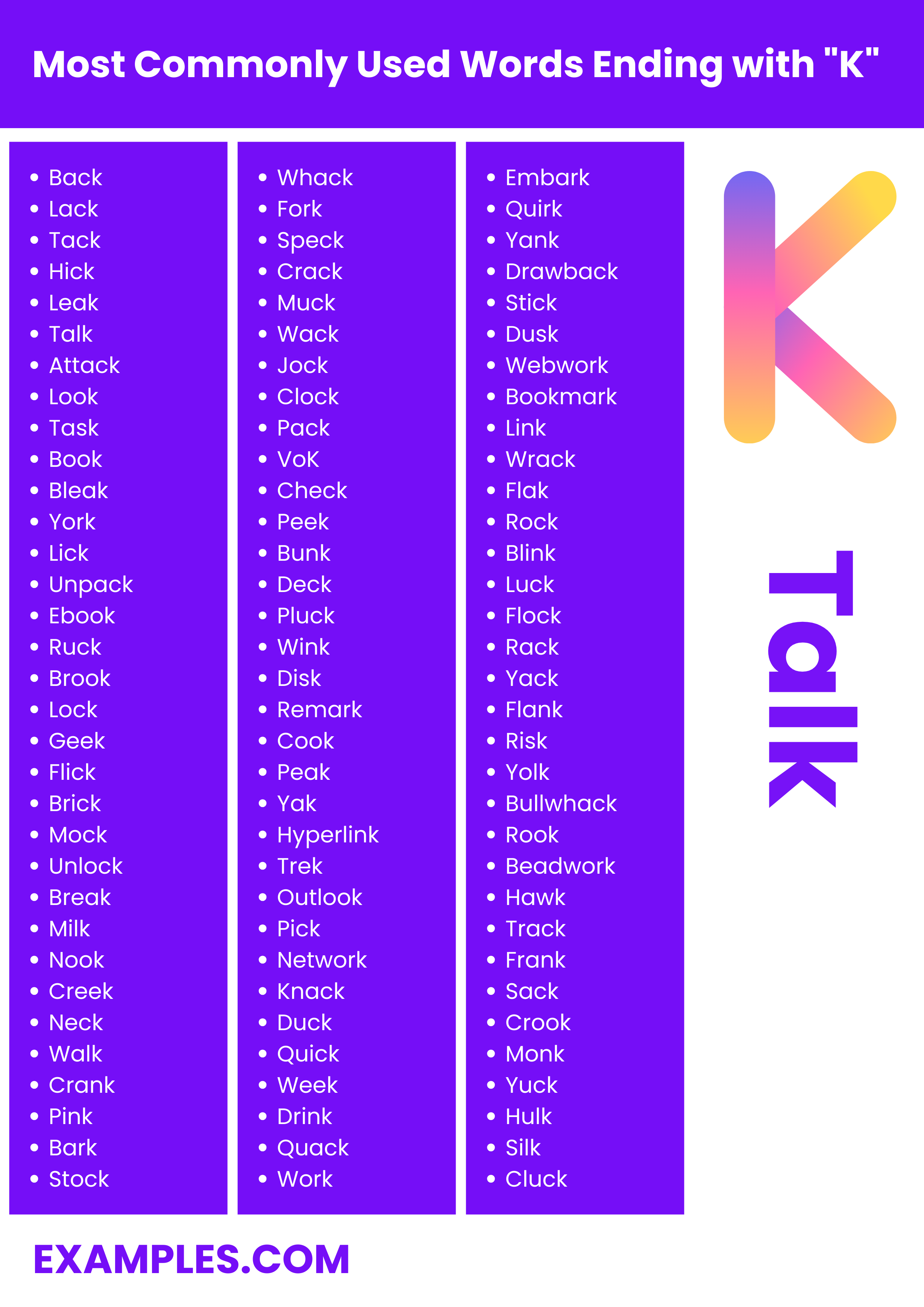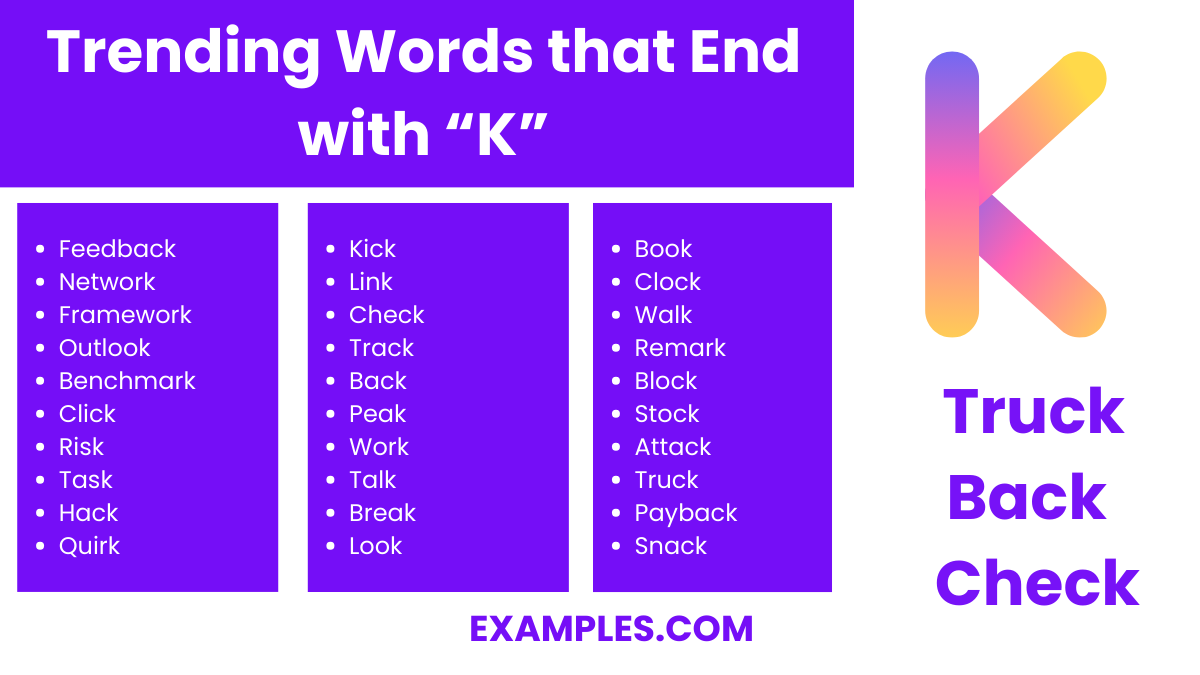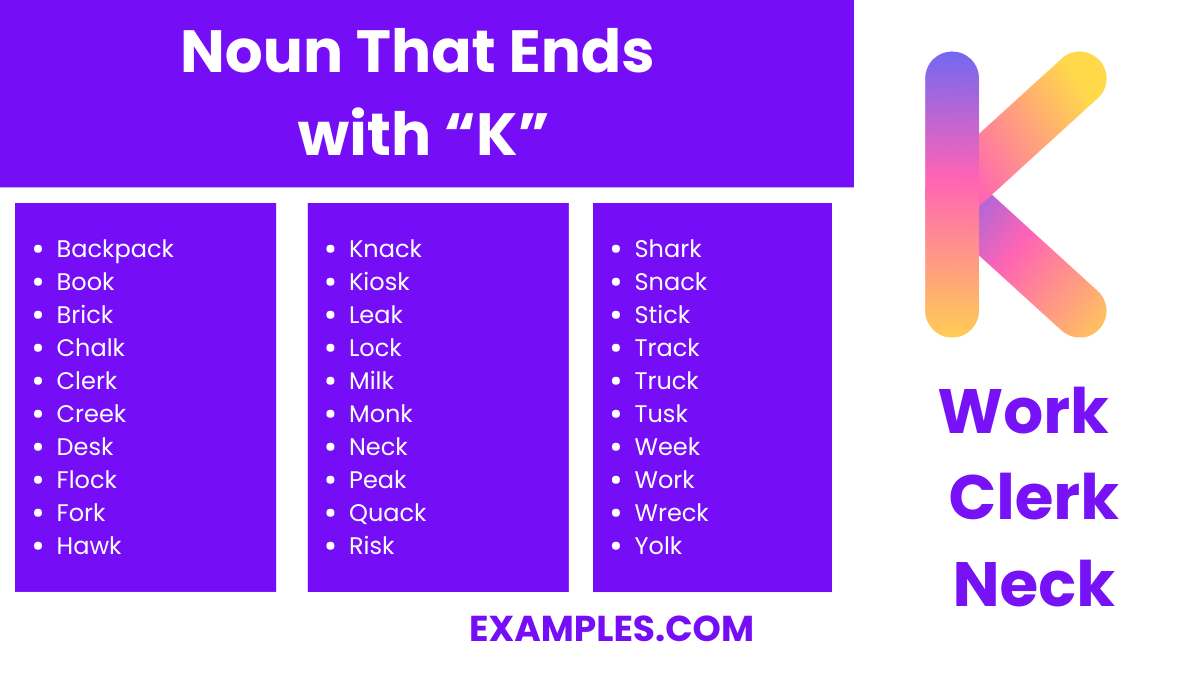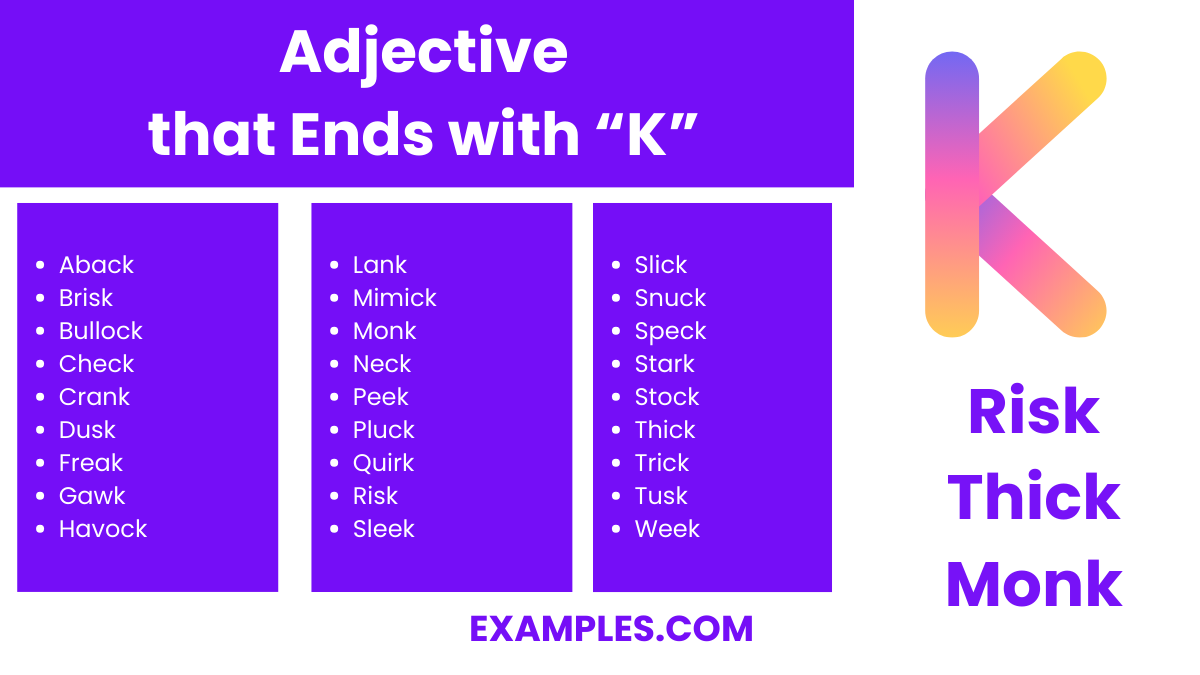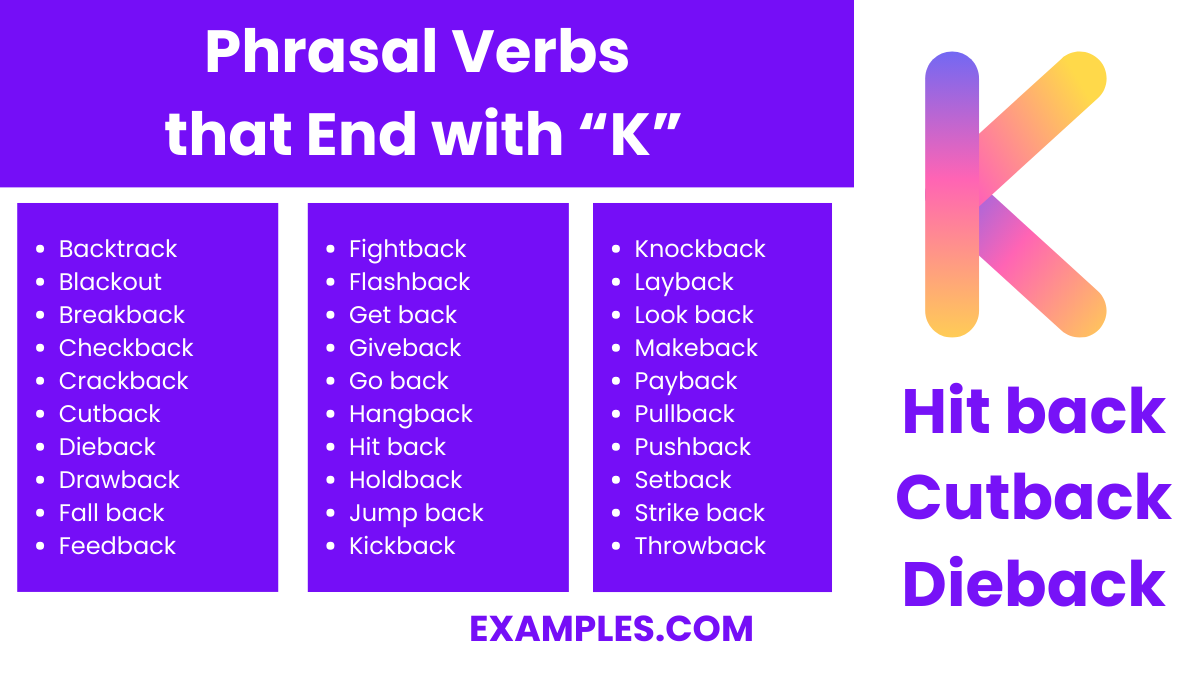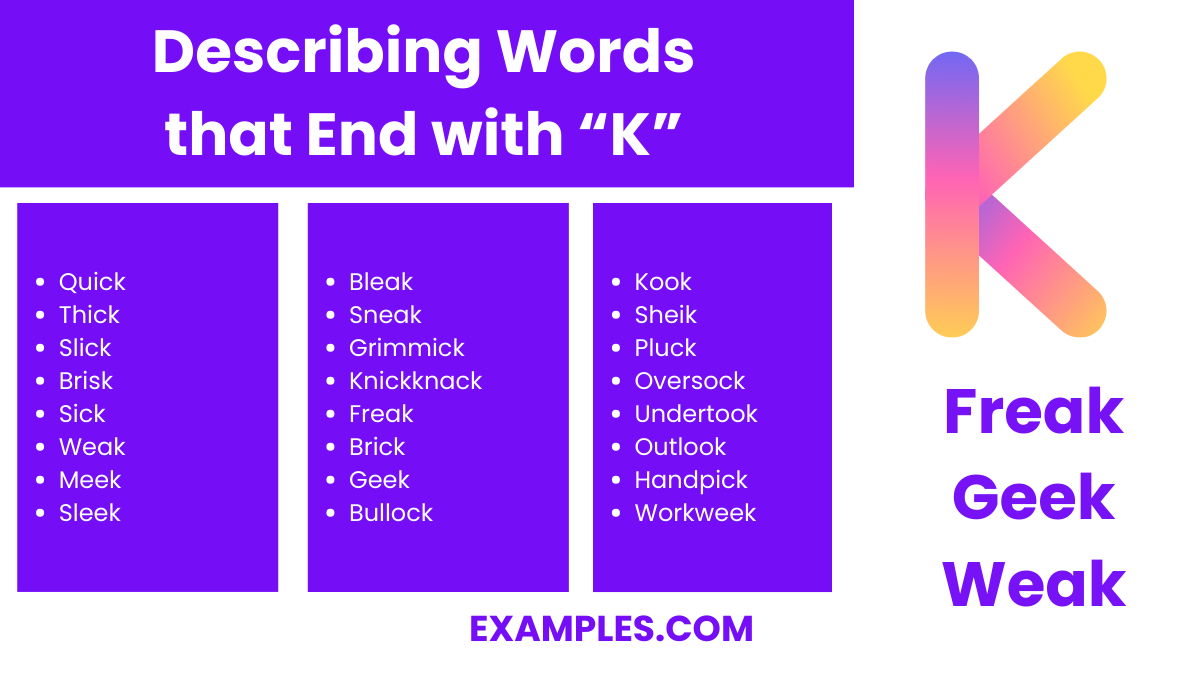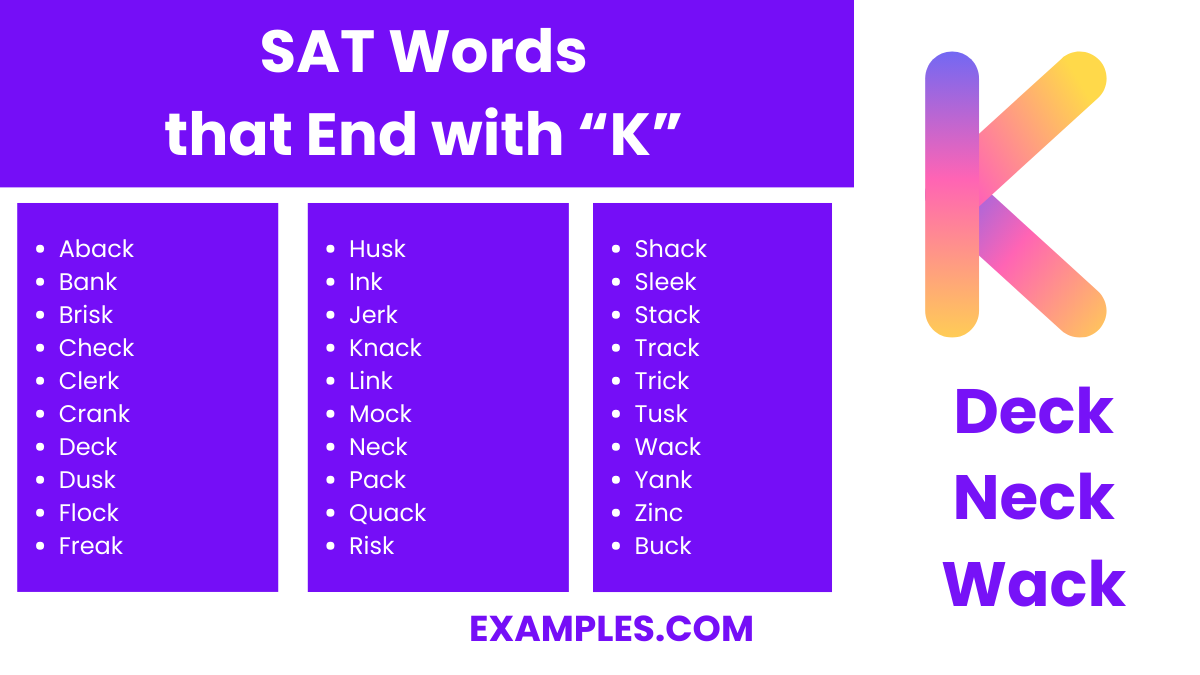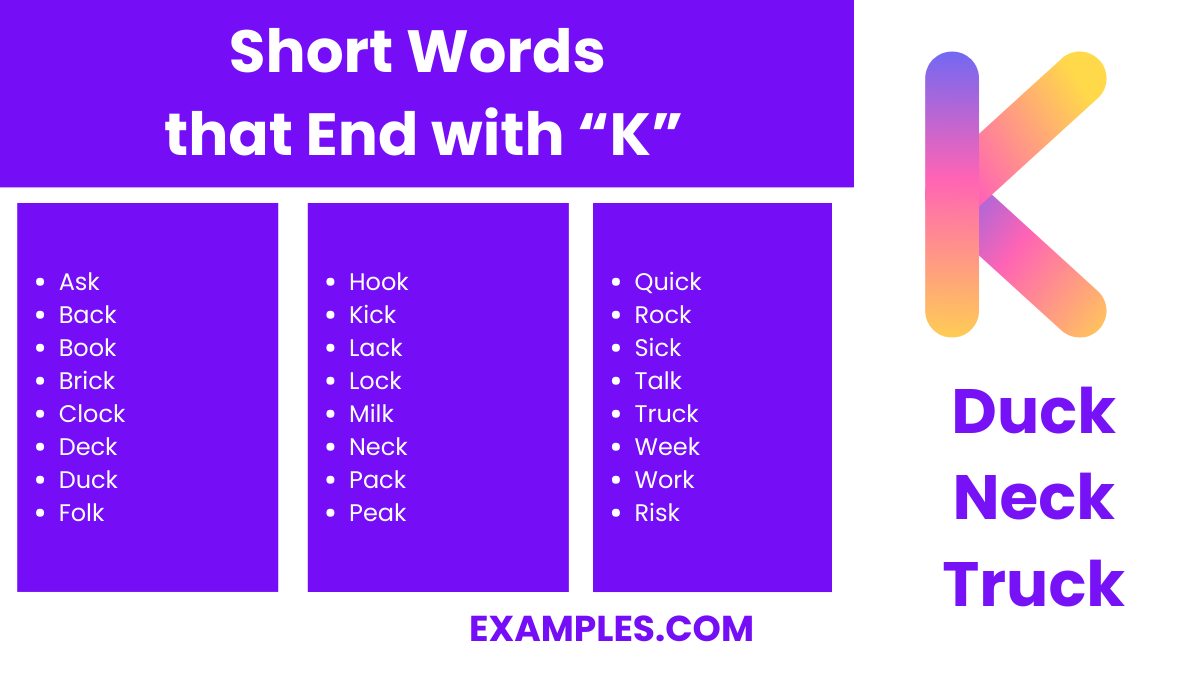150+ Words Ending With K List, Meaning, PDF
A linguistic exploration of words ending with ‘K’ unveils a unique facet of the English language, marked by a blend of crisp sounds and diverse meanings. These ‘K’ words ending, ranging from the sharpness of “quick” to the tranquility of “creek,” contribute significantly to the richness of English vocabulary. For educators and learners alike, delving into this set of words opens up avenues for enhancing phonetic understanding, spelling prowess, and lexical variety. Whether it’s the rhythmic “click” of a button or the nostalgic “reminisck”, each word adds a distinctive texture to communication, making the study of ‘K’-ending words not just an academic exercise but a journey into the heart of English’s sonic landscape.
Download Most Commonly Used Words Ending with K - PDF
150 Most Commonly Used Words Ending with “K”
The English language is rich with words ending in “K,” offering a diverse range of vocabulary that is essential for effective communication. This compilation of 150 words, carefully organized into a table with six columns, is a valuable resource for teachers. It serves as an educational tool to enhance vocabulary lessons, making learning more interactive and engaging for students. Each word in this table is unique, ensuring a wide spectrum of words that are commonly used in various contexts. This list can be incorporated into spelling bees, creative writing exercises, and vocabulary quizzes, making it an excellent addition to any English language curriculum.
| Back | Brick | Clock | Duck | Flock | Knock |
| Lack | Mock | Pack | Quick | Rack | Sick |
| Tack | Unlock | Vok | Week | Yack | Forelock |
| Hick | Break | Check | Drink | Flank | Kick |
| Leak | Milk | Peek | Quack | Risk | Snack |
| Talk | Nook | Bunk | Work | Yolk | Haystack |
| Attack | Creek | Deck | Embark | Bullwhack | Kiosk |
| Look | Neck | Pluck | Quirk | Rook | Shriek |
| Task | Walk | Wink | Yank | Beadwork | Block |
| Book | Crank | Disk | Drawback | Hawk | Lurk |
| Bleak | Pink | Remark | Stick | Track | Wreck |
| York | Bark | Cook | Dusk | Frank | Ink |
| Lick | Stock | Peak | Webwork | Sack | Trick |
| Unpack | Whack | Yak | Bookmark | Crook | Dock |
| Ebook | Fork | Hyperlink | Link | Monk | Puck |
| Ruck | Speck | Trek | Wrack | Yuck | Black |
| Brook | Crack | Outlook | Flak | Hulk | Jack |
| Lock | Muck | Pick | Rock | Silk | Tuck |
| Geek | Wack | Network | Blink | Cluck | Feedback |
| Flick | Jock | Knack | Luck | Nick | Plank |
Most Trending Words that End with “K”
In the dynamic English language landscape, incorporating trending words ending in ‘K’ enriches teaching with current and relatable content. These words, mirroring societal and technological shifts, resonate with students, enhancing their vocabulary and linking learning to real-world contexts. This concise list of 30 trending ‘K’-ending words is ideal for classroom integration, supporting vocabulary growth and contextual understanding. Including Rhyming Words, Daily Use English Words, and addressing singular & plural words broadens linguistic comprehension and application, making English lessons more engaging and relevant.
- Feedback – Information about reactions to a product or a person’s performance.
- Network – A system of interconnected people or things.
- Framework – An essential supporting structure or a set of ideas.
- Outlook – The view or prospect for the future.
- Benchmark – A standard or point of reference.
- Click – A short, sharp sound or act of selecting something on a computer.
- Risk – A situation involving exposure to danger.
- Task – A piece of work to be done.
- Hack – A strategy or technique for managing one’s time or activities more efficiently.
- Quirk – A peculiar behavioral habit.
- Kick – A sudden forceful movement.
- Link – A connection between two things.
- Check – To examine something to determine its accuracy.
- Track – To follow the course or trail of something.
- Back – The rear surface of the human body from the shoulders to the hips
- Peak – The highest point or maximum level.
- Work – Activity involving mental or physical effort done to achieve a result.
- Talk – Engage in speech.
- Break – An interruption of continuity or uniformity.
- Look – Direct one’s gaze toward someone or something.
- Book – A written or printed work.
- Clock – A device for telling the time.
- Walk – Move at a regular pace by lifting and setting down each foot in turn.
- Remark – Say something as a comment.
- Block – A large solid piece of hard material.
- Stock – The goods or merchandise kept in a store or warehouse.
- Attack – Take aggressive action against.
- Truck – A large, heavy motor vehicle for transporting goods.
- Payback – A return on an investment or the return of a favor.
- Snack – A small amount of food eaten between meals.
New & Latest Added Words that End with “K”
new and recently added words ending with “K” opens a window into the evolving nature of the English language. These additions, often a reflection of contemporary culture, technology, and societal trends, enrich the lexicon with fresh expressions and terms. For educators, this collection serves as a vibrant resource to modernize lesson plans and spark students’ interest. Integrating Compound Words enhances understanding of complex word formations, while Encouraging Words motivate and uplift, making language learning more dynamic and positive. This curated list of ‘K’-ending words not only broadens vocabulary but also bridges classroom learning with the linguistic developments of the modern world
- Techspeak – Language or jargon used in the field of technology.
- Cyberattack – An attempt by hackers to damage or destroy a computer network or system.
- Ebook – An electronic version of a printed book.
- Greenback – Informal term for U.S. paper currency.
- Hyperlink – A link from a hypertext file to another location or file.
- Infotrack – A system or process for tracking information.
- Jetpack – A backpack-type device using jet propulsion for flying.
- Klick – Slang term for a kilometer.
- Lifehack – A strategy or technique adopted in order to manage one’s time and daily activities in a more efficient way.
- Mindfuck – Something that disrupts or confuses one’s understanding or perception.
- Nanorisk – A risk associated with nanotechnology.
- Outback – Remote, sparsely populated inland regions of Australia.
- Payback – A return on an investment or the return of a favor.
- Quickpick – A selection made quickly or without careful consideration.
- Riffrock – A style of rock music characterized by a repetitive riff.
- Spacewalk – An act of moving or floating outside a spacecraft while in space.
- Telework – Work done remotely, using the internet and telecommunications.
- Ultrabook – A high-end, ultraportable laptop.
- Webwork – Work or tasks performed using the Internet.
- Xenobank – A repository for storing xenotransplants.
- Ziplink – A link in a computer file or document that allows quick access to other parts or files.
- Thinktank – A body of experts providing advice and ideas on specific political or economic problems.
- Quirk – A peculiar behavioral habit.
- Risk – A situation involving exposure to danger.
- Stock – The capital raised by a corporation through the issue of shares.
- Track – A rough path or minor road, typically one beaten by use rather than constructed.
- Walk – Move at a regular pace by lifting and setting down each foot in turn.
- Yak – A large domesticated wild ox with shaggy hair, humped shoulders, and large horns.
Noun That Ends with “K”
The English language’s depths showcases the intriguing variety of nouns ending with “K.” These nouns enrich vocabulary and diversify communication, offering educators a valuable tool for expanding students’ lexical knowledge. The list below, with each word’s definition, serves as an educational resource for both teaching and learning. It’s particularly suited for those looking to enhance classroom materials and students aiming to widen their linguistic scope. Including Dictation Words helps hone spelling and listening skills, while Praising Words boost morale and encourage positive expression, making this compilation an asset for comprehensive language development.
- Backpack – A bag carried on the back, typically with straps.
- Book – A written or printed work consisting of pages bound together.
- Brick – A small rectangular block typically made of fired or sun-dried clay, used in building.
- Chalk – A soft white limestone used for writing on blackboards.
- Clerk – An employee who performs clerical work.
- Creek – A small stream or minor tributary of a river.
- Desk – A piece of furniture with a flat top for writing, reading, or using a computer.
- Flock – A group of birds or a group of domesticated animals.
- Fork – A tool with two or more prongs, used for eating or cooking.
- Hawk – A bird of prey with broad rounded wings and a long tail.
- Knack – A special skill or talent for doing something.
- Kiosk – A small open-fronted hut or cubicle from where newspapers, refreshments, tickets, etc., are sold.
- Leak – An accidental hole, crack, or flaw that allows something (liquid or gas) to escape.
- Lock – A mechanism for keeping a door, lid, etc., fastened.
- Milk – The white liquid produced by mammals as food for their young.
- Monk – A member of a religious community of men typically living under vows of poverty, chastity, and obedience.
- Neck – The part of a person’s or animal’s body connecting the head to the rest of the body.
- Peak – The pointed top of a mountain.
- Quack – A person falsely claiming to have a special knowledge or skill, especially in medicine.
- Risk – A situation involving exposure to danger.
- Shark – A long-bodied chiefly marine fish with a cartilaginous skeleton.
- Snack – A small amount of food eaten between meals.
- Stick – A thin piece of wood that has fallen or been cut from a tree.
- Track – A rough path or minor road, typically one beaten by use rather than constructed.
- Truck – A large, heavy road vehicle used for transporting goods, materials, or troops.
- Tusk – A long, pointed tooth, especially one which protrudes from the closed mouth, as in elephants.
- Week – A period of seven days.
- Work – Activity involving mental or physical effort done in order to achieve a purpose or result.
- Wreck – The destruction of a ship at sea; a shipwreck.
- Yolk – The yellow internal part of an egg.
Adverb That Ends with “K”
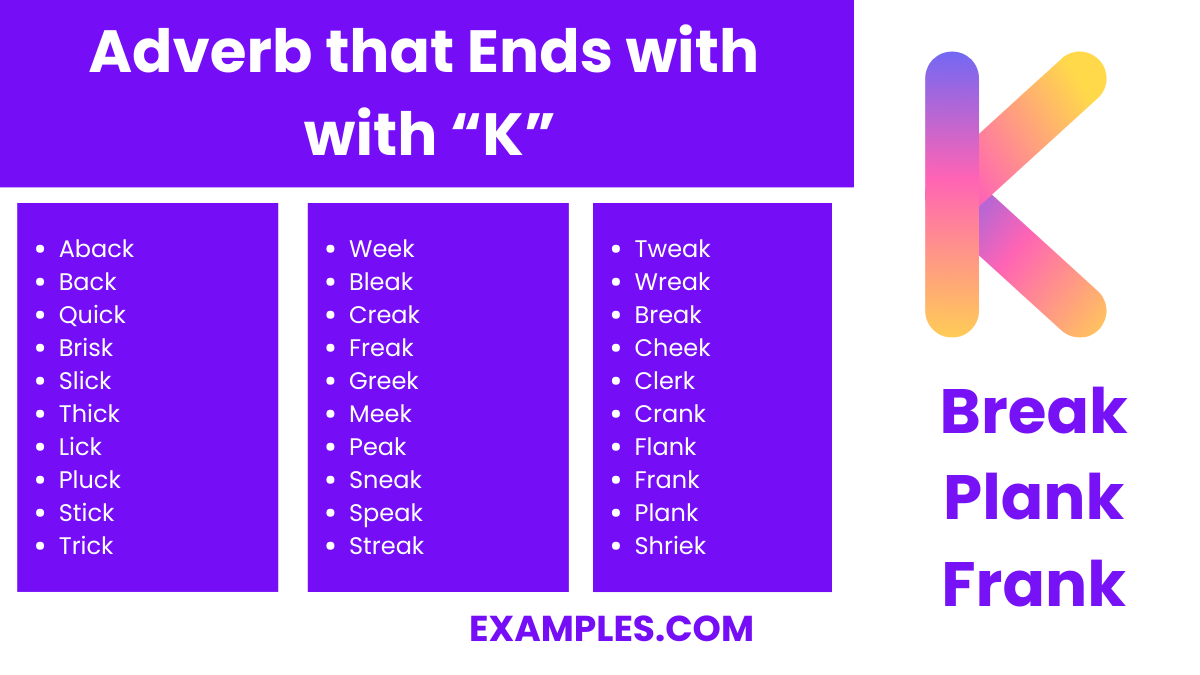
Adverbs are a crucial part of speech, often adding context and depth to verbs, adjectives, or even other adverbs. Specifically, adverbs words that end in “k” possess a unique charm, often bringing a rhythmic or emphatic tone to sentences. Teachers looking to enhance their students’ vocabulary and fluency in English communication will find this list of adverbs ending in “k” particularly useful. These adverbs range from everyday terms to more advanced vocabulary, suitable for various learning levels. By incorporating these words into lessons, educators can effectively broaden their students’ linguistic skills, making their communication more dynamic and expressive.
- Aback – taken by surprise.
- Back – in return or reply.
- Quick – with rapidity.
- Brisk – in an energetic or alert manner.
- Slick – in a smooth, easy, or effortless manner.
- Thick – in a dense or heavy manner.
- Lick – swiftly or sharply.
- Pluck – with courage or resolution.
- Stick – persistently or obstinately.
- Trick – in a deceitful manner.
- Week – weekly or once a week.
- Bleak – in a bare or desolate way.
- Creak – with a creaking sound.
- Freak – in a strange or unusual manner.
- Greek – in the manner of Greeks.
- Meek – in a submissive or gentle way.
- Peak – at the highest or maximum level.
- Sneak – in a secretive or stealthy manner.
- Speak – verbally or orally.
- Streak – rapidly or swiftly.
- Tweak – with a sharp twist or pull.
- Wreak – in a way that causes damage or harm.
- Break – in a depressing or dismal manner.
- Cheek – boldly or impudently.
- Clerk – in the manner of a clerk.
- Crank – in an irritable or eccentric manner.
- Flank – on or from the side.
- Frank – in an open, honest, or direct manner.
- Plank – solidly or firmly.
- Shriek – with a high-pitched, piercing sound.
Adjectives That Ends with “K”
Adjectives play a pivotal role in the English language, enriching sentences with vivid descriptions. Among these, adjectives ending in “K” stand out for their rarity and unique ability to depict objects, emotions, and scenarios. These terms are invaluable in creative writing, offering students learning English an opportunity to broaden their vocabulary in an engaging manner. Educators can leverage this list of 30 ‘K’-ending adjectives, each accompanied by its definition, to diversify and enliven their teaching. Including Ness Words can deepen students’ understanding of qualities and states, while Pictionary Words encourage visual learning and creativity, making this collection a versatile tool in English language education.
- Aback – Taken by surprise.
- Brisk – Quick and active; lively.
- Bullock – Relating to a young bull.
- Check – Marked with squares.
- Crank – Eccentric or strange.
- Dusk – Partially dark or shadowy.
- Freak – Highly unusual or irregular.
- Gawk – Awkward or clumsy.
- Havock – Great destruction or devastation.
- Husk – Dry outer covering of some fruits or seeds.
- Knickknack – A small worthless object.
- Lank – Slender and long.
- Mimick – Imitative or copied.
- Monk – Related to a member of a religious community.
- Neck – Relating to the part of the body connecting the head to the body.
- Peek – A quick or secret look.
- Pluck – Showing courage or determination.
- Quirk – A peculiar behavioral habit.
- Risk – Involving the possibility of danger or harm.
- Sleek – Smooth and glossy.
- Slick – Done or operating in an impressively smooth and efficient way.
- Snuck – Moved stealthily or secretly (past of sneak).
- Speck – A tiny spot.
- Stark – Harsh, unadorned, or plain.
- Stock – Regular or usual.
- Thick – Having a large distance between opposite sides.
- Trick – Intended to deceive or confuse.
- Tusk – A long, pointed tooth, particularly of an elephant.
- Week – Period of seven days.
- Wreck – Something badly damaged or destroyed.
Phrasal Verbs That End with K
Phrasal verbs are a vital component of English language learning, especially for students striving to enhance their communication skills. These verbs, consisting of a verb and a preposition or adverb, often end in “k”, presenting unique meanings. This article provides a comprehensive list of 30 phrasal verbs ending with “k”, each accompanied by its definition. Understanding these phrasal verbs is crucial for students to grasp the nuances of English, aiding in more effective communication. Teachers can use these examples to enrich their lessons, offering students practical insights into everyday English usage.
- Backtrack: To reverse one’s opinion or decision.
- Blackout: To lose consciousness or to cause lights to go out.
- Breakback: To exert a great effort.
- Checkback: To verify or review something.
- Crackback: In sports, a block made against a pursuing opponent.
- Cutback: A reduction in something, like expenses.
- Dieback: A condition where parts of a plant die.
- Drawback: A disadvantage or hindrance.
- Fall back: To retreat or move back.
- Feedback: Response or reaction to a process or activity.
- Fightback: A vigorous effort to counteract a problem.
- Flashback: A sudden memory of a past event.
- Get back: To return to a place or to recover something.
- Giveback: To provide a return or compensation.
- Go back: To return to a place or situation.
- Hangback: To hesitate or be reluctant.
- Hit back: To retaliate or respond forcefully.
- Holdback: To restrain or delay something.
- Jump back: To move back suddenly in surprise.
- Kickback: An illegal payment made in return for a favor.
- Knockback: A setback or rejection.
- Layback: In climbing, a move where one leans back against the rock.
- Look back: To reminisce or review past events.
- Makeback: To earn or regain something lost.
- Payback: A return on an investment or revenge.
- Pullback: A withdrawal or retreat.
- Pushback: Resistance or objection to something.
- Setback: A difficulty or delay in progress.
- Strike back: To attack or retaliate against a previous attack.
- Throwback: A return to earlier characteristics or practices.
Describing Words That End with “K”
Describing words, often known as adjectives, play a crucial role in the English language. They serve to modify nouns, giving more detail or context. A unique and interesting category within this group is words that end with the letter ‘K’. These words are not only distinctive in their phonetics but also in the way they add flavor to our descriptions. For teachers looking to enrich their students’ vocabulary, this set of words is particularly engaging. They challenge students to expand beyond common adjectives, fostering creativity and precision in language use. Incorporating these words into lessons can be both fun and educational. Activities like creative writing, vocabulary games, or descriptive challenges using these words can enhance students’ engagement and understanding. Here’s a list of 30 describing words ending with ‘K’ and their meanings, which can serve as a great resource for teaching:
- Quick – Fast in movement or action.
- Thick – Having a large distance between opposite sides.
- Slick – Done in a smooth and efficient way; clever and quick.
- Brisk – Active, fast, and energetic.
- Sick – Affected by physical or mental illness.
- Weak – Lacking the power to perform physically demanding tasks.
- Meek – Quiet, gentle, and easily imposed on; submissive.
- Sleek – Smooth and glossy; having a streamlined, efficient appearance.
- Bleak – Lacking in warmth, life, or kindliness; grim.
- Sneak – Done or acting in a stealthy way.
- Grimmick – An ingenious or novel device, scheme, or stratagem.
- Knickknack – A small worthless object, especially a household ornament.
- Freak – Very unusual and unexpected.
- Brick – Made of, resembling, or relating to bricks.
- Geek – An unfashionable or socially inept person.
- Bullock – A young bull.
- Kook – A crazy or eccentric person.
- Sheik – A leader in an Arab family or village.
- Pluck – Spirited and determined courage.
- Oversock – Excessively stock or supply with.
- Undertook – Commit oneself to and begin (an enterprise or responsibility).
- Outlook – A person’s point of view or general attitude to life.
- Handpick – Carefully select as being the best or most suitable.
- Workweek – The part of the seven-day week devoted to labor.
SAT Words That End with “K”
Diving into SAT vocabulary, especially words ending with “k,” presents a distinct advantage for both educators and learners. This carefully curated list of ‘k’-ending words is tailored to bolster SAT preparation, enhancing not just test scores but overall language proficiency. For teachers aiming to broaden their instructional arsenal and support students in navigating the complexities of SAT vocabulary, this selection of 30 words is invaluable. Each word is accompanied by its definition, offering clarity and context. Incorporating Vowel Words emphasizes phonetic diversity, while Sight Words aid in quick recognition, making this compilation an essential resource for effective SAT prep and comprehensive language learning.
- Aback – taken by surprise.
- Bank – a financial institution.
- Brisk – quick and energetic.
- Check – to stop or slow down; also, a banking term.
- Clerk – a person who manages the records or accounts in an office.
- Crank – a part of an axle or shaft bent out at right angles.
- Deck – a platform in a ship or vehicle.
- Dusk – the time at the end of the day just before dark.
- Flock – a group of birds or animals.
- Freak – a very unusual and unexpected event or situation.
- Husk – the dry outer covering of some fruits or seeds.
- Ink – a colored fluid used for writing.
- Jerk – a quick, sharp, sudden movement.
- Knack – a special skill or ability.
- Link – to connect or join.
- Mock – to tease or laugh at in a scornful or contemptuous manner.
- Neck – the part of a person’s or animal’s body connecting the head to the rest of the body.
- Pack – to fill (a suitcase or bag), especially with clothes and other items needed for travel.
- Quack – a person who dishonestly claims to have special knowledge and skill in some field, typically medicine.
- Risk – a situation involving exposure to danger.
- Shack – a roughly built hut or cabin.
- Sleek – smooth and glossy.
- Stack – to arrange or place something in a stack.
- Track – to follow by footprints or other traces.
- Trick – a cunning or skillful act or scheme intended to deceive or outwit someone.
- Tusk – a long, protruding tooth, as from an elephant.
- Wack – strange or unusual.
- Yank – to pull with a sharp movement.
- Zinc – a chemical element, a metal often used in alloys and in galvanizing iron.
- Buck – to resist or to move suddenly and sharply; a male deer.
Perspective Words Ending with “K”
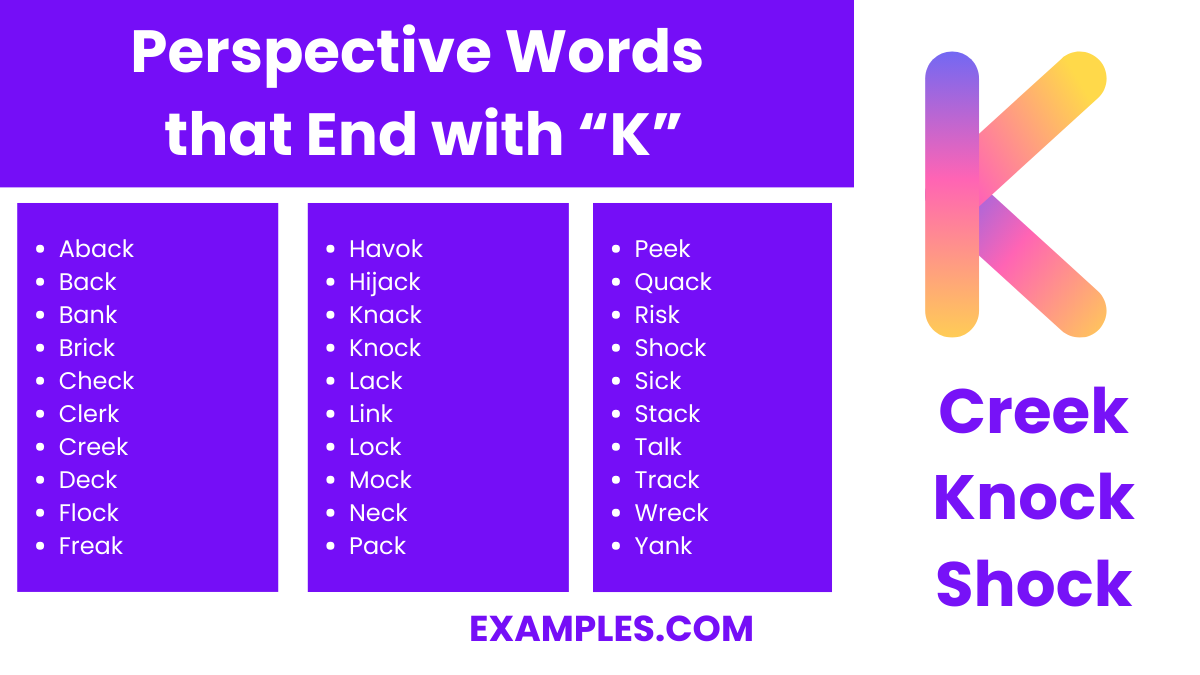
Perspective words that conclude with “K” bring a distinctive flavor to the English language, blending unique phonetics with rich meanings. These words, often underappreciated, are potent in enhancing communication and invigorating creative writing. As educators steering students through the vastness of English vocabulary, spotlighting these “K”-ending words is pivotal. Their introduction into lessons can significantly elevate students’ linguistic prowess, widening their expressive and interpretative horizons. Embarking on this exploration, we present a compilation of 30 perspective words ending in “K,” each elucidated with its definition, poised to enrich students’ vocabularies and ignite their fascination with English’s subtleties. Including Christmas Words introduces seasonal vocabulary, while Consonant Words focus on phonetic diversity, making this journey through ‘K’-ending words a comprehensive linguistic adventure.
- Aback – Taken by surprise.
- Back – The rear side of something.
- Bank – A financial institution or a river’s edge.
- Brick – A block used in building.
- Check – To examine or a banking term.
- Clerk – An office worker or salesperson.
- Creek – A small stream.
- Deck – A platform on a ship or in a building.
- Flock – A group of birds or sheep.
- Freak – Something unusual or unexpected.
- Havok – Great destruction or chaos.
- Hijack – To unlawfully seize control.
- Knack – A skill or talent for something.
- Knock – To hit something sharply.
- Lack – The state of being without something.
- Link – To connect or a segment of a chain.
- Lock – A device for securing a door.
- Mock – To ridicule or imitate in jest.
- Neck – The part of the body connecting the head and torso.
- Pack – A bundle or to fill tightly.
- Peek – A quick look.
- Quack – The sound a duck makes or a fraudulent person.
- Risk – The possibility of loss or harm.
- Shock – A sudden, upsetting surprise.
- Sick – Unwell or disgusted.
- Stack – A pile arranged neatly.
- Talk – To speak or converse.
- Track – A path or course laid out.
- Wreck – To destroy or a destroyed thing.
- Yank – To pull sharply.
Short Words That End with “K”
Discovering short words ending with the letter ‘K’ can be a fun and educational journey for both teachers and students. As educators, it’s vital to enrich students’ vocabularies with a variety of words, including those with specific ending sounds. Focusing on words ending in ‘K’ offers a unique opportunity to explore their distinct phonetic qualities and usage in English. This exploration not only enhances spelling skills but also aids in phonemic awareness, an essential component of language learning. Below is a list of short, impactful words ending in ‘K’ that teachers can introduce to their students. Each word is accompanied by its definition, making it easier to understand and incorporate into daily vocabulary.
- Ask – To request information.
- Back – The rear part of something.
- Book – A written or printed work.
- Brick – A block used in building.
- Clock – A device for telling time.
- Deck – A platform on a ship or house.
- Duck – A waterbird with webbed feet.
- Folk – People in general.
- Hook – A curved piece of metal for catching things.
- Kick – To strike with the foot.
- Lack – The state of being without something.
- Lock – A device for securing a door.
- Milk – A white liquid produced by mammals.
- Neck – The part of the body between the head and shoulders.
- Pack – To fill a container with items.
- Peak – The top of a mountain.
- Quick – Fast or rapid.
- Rock – A solid mineral material.
- Sick – Affected by illness.
- Talk – To communicate by speaking.
- Truck – A large, heavy road vehicle.
- Week – A period of seven days.
- Work – Activity involving mental or physical effort.
- Risk – The possibility of loss or harm.
In conclusion, teaching words ending with ‘K’ can significantly enhance students’ vocabulary and communication skills. Remember, repetition and practical examples are key. Encourage students to explore these words through engaging activities and daily use in conversations. As educators, we have the unique opportunity to guide them in this linguistic journey, enriching their command of the English language. Let’s make learning these words an enjoyable and rewarding experience for our students!


